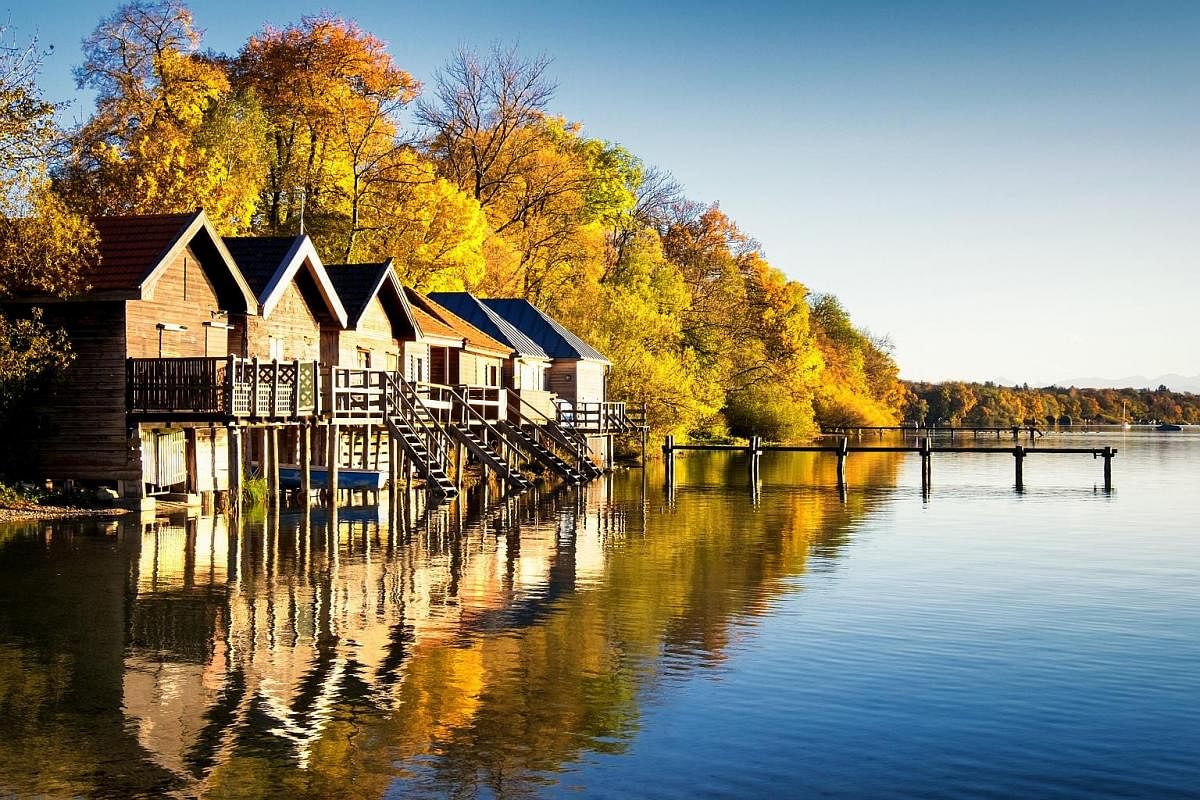-

WHO: Mr Jakob Angele, 36, Chief Executive, Asia Pacific, of food delivery service Food Panda. PHOTO: FOODPANDA
Travel Black Book: CEO Series
Travel Black Book: Scenic Munich
With its beer gardens, friendly residents and stunning mountains, it is no wonder that the city is known as Earth's biggest village


PHOTO: FOODPANDA
WHO: Mr Jakob Angele, 36, Chief Executive, Asia Pacific, of food delivery service Food Panda.
Favourite destination: Munich, Germany, where I lived for 10 years, has everything: relaxing beer gardens, great weather, lots of history and museums. It is close to mountains for hiking, home to friendly and open people, and has a very relaxed vibe. People often call it the biggest village on Earth because of these reasons.
SEE
Munich is known for its many museums and galleries that boast world-class art and antiques. There are more than 80 museums, including the vast 17th-century Baroque summer palace Nymphenburg Palace, Park and Marstallmuseum (www.schloesser.bayern.de/englisch/palace/uebers/nymphbur.htm); and the Deutsches Museum (www.deutsches-museum.de/en/information), the largest technical and scientific museum in the world with many interactive exhibitions.
I particularly like the Kreativquartier in Dachauer Street (www.facebook.com/KreativquartierMuenchen/). The run-down 20ha former military and industrial area in the middle of the city - surrounded by Olympia Park, the Munich University of Applied Sciences and the Goethe Institute - is a complex of buildings converted into artist studios, galleries and collectives.
I like Kreativquartier for its contemporary feel and the variety of arts experiences it houses, from performance art and exhibitions to workshops that focus on urban life. It is worth a visit if you want to experience all of the city in one place.
To get to know the local culture, visit a biergarten with friends. A biergarten is an outdoor area where beer and food are served, and hanging out in one is not just an activity, it is a way of life for all Germans.
The most popular biergarten is the one in Englischer Garten (English Garden), which is one of the world's largest urban public parks. At 370ha, it is larger than New York's Central Park and London's Hyde Park. The Englischer Garten is also known for its river, where people surf, as well as for its nudist beach.
You can find biergartens everywhere, and if they don't serve food, you can usually bring your own. Everyone sits at shared tables, so Germans and tourists have the opportunity to socialise. I can't think of a better way to understand local culture than to befriend locals.
If I have a few hours to spare, I'd climb the 299 steps of St Peter's Church, an iconic church with sweeping views of the city. It's a great way to get your bearings.
-
GETTING THERE
-
 Singapore Airlines has daily direct flights from Singapore to Munich.
Singapore Airlines has daily direct flights from Singapore to Munich.TIPS
•I head back every year in September, which is a nice time of the year climate-wise. Ideally, one should stay for five days to a week to explore the best that the city and region have to offer.
•Munich has inspired many authors and novels over the years - from gritty wartime reads to light page-turners. • To get to know the city from a different perspective, I suggest reading Straight Into Darkness by Faye Kellerman, a thriller set in the 1920s; How To Steal A Lion by Kirk Haggerty, about a young aspiring journalist who accepts the task of stealing a lion statue during Oktoberfest for a million euros; Risking Exposure by Jeanne Moran, a work of historical fiction about a young girl with polio in Munich in 1938; and Ruins Of War by John A. Connell, a murder mystery set in the winter of 1945, seven months after the Nazi defeat.
•Munich is generally a safe place to travel in Europe. Just take the usual precautions.
EAT
Wirtshaus Hohenwart (hohenwart.net) is a pillar of Munich food culture. The restaurant has been serving beer and traditional Bavarian food since 1896.
The 120-year-old building was gutted last year, and then refurbished to its rustic glory. Its original furnishings - including a vintage bowling lane - were restored, while newer additions - such as a soundtrack of Bavarian comedian Gerhard Polt playing in the bathrooms - adds a humorous modern touch.
The restaurant excels at the classics, such as veal schnitzel fried in golden and buttery breadcrumbs.
Munich is also famous for its many varieties of wurst (sausages) and I always make sure tovisit Nurnberger Bratwurst Gloeckl (www.bratwurst-gloeckl.de/en/home/). Its renowned grilled pork sausages are made in-house and roasted over an open beech wood fire.
There's nothing better than to eat sausages with fresh chanterelle mushrooms in a cream sauce with herbs and homemade dumplings, and then wash them down with beer. A meal like this costs about €20 (S$32).
Munich has seen a coffee revolution in recent years. There are more little independent cafes opening there. I like Man Versus Machine Coffee Roasters (mvsm.coffee), an excellent cafe with its own roasting facility. The bright, contemporary space is perfect for whiling the hours away and watching passers-by. I recommend the filter coffee, which is prepared in three different ways - pour-over, siphon or AeroPress - and the cinnamon pastry here is divine.
PLAY
Munich's best-known festival is Oktoberfest (www.munichsoktoberfest.com). People can be put off because of the crowds - more than six million people attend each year, making it the biggest beer festival in the world - but I have had many good times there.
It is not all about drinking beer. It is also about having a good time with friends, enjoying the live bands and a lot of dancing. And while it can be touristy, the atmosphere is great.
Auer Dult (www.muenchen.de/int/en/shopping/markets/auer-dult.html) is a traditional market that is set up thrice a year in the square around Mariahilf Church and is one of the city's major events.About 300 stalls offer rare books and antique prints, haberdashery goods, natural hair and skincare products, Europe's largest selection of china and cooking equipment, as well as traditional garments such as lederhosen and dirndl.
There are also a number of child-friendly activities for families, including horse-riding, a puppet show, merry-go-rounds and bumper car rides. Many stalls sell beer, fruit juices and fresh coffee as well as traditional Bavarian snacks such as fish-on-a-stick, barbecued sausages and chicken.
Part of Munich's charm is its proximity to the Bavarian Alps along the Austrian border. The mountains have many picturesque villages, spas and health retreats where visitors can hike, ski, snowboard and paraglide. Garmisch-Partenkirchen, one of the region's largest resort towns, is just an hour away from Munich by car.
On the way, you can stop in the Starnberg Five Lake Region (www.bavaria.by/starnberg-five-lake-region-germany), which is easily accessible by public transport from the city centre. Each lake has its own unique character.
There is a nice little resort village on Lake Ammersee called Herrsching, which is perfect for a picnic. I like to head out there with friends for a barbecue or picnic and watch the sunset. It is an incredibly tranquil scene with a stunning backdrop of the Alps' snowy peaks.
SHOP
Within Munich city centre, there are plenty of shops, boutiques and department stores.
Sendlinger Strasse is a typical shopping district with many family-run retail stores. It is a perfect spot to go to if you are looking for arts and crafts and unique gifts.
A unique food item that would make a good souvenir is lebkuchen, typical Bavarian gingerbread creations which come in all shapes and sizes - from squares to stars and small biscuits to cakes. These can be bought from markets all over town.
I also like to bring back some authentic German sauerkraut. A favourite is Hengstenberg sauerkraut, which can be found in supermarkets for about €10 for a 680g jar. I also love German condiments such as senf (mustard) and currygewurzketchup (curried ketchup), available at supermarkets.
STAY
Hotel Opera (www.hotel-opera.de/en/) is the perfect place to stay if you are looking for somewhere quiet and charming.
It is not far away from the bustle of Munich's city centre, but distant enough to take in the best parts of the city, with the Bavarian State Opera, the English Garden and the main museums at the doorstep.
With its classically furnished rooms and cosy decor, to me, it's the perfect spot to enjoy the city.
Join ST's Telegram channel and get the latest breaking news delivered to you.
A version of this article appeared in the print edition of The Sunday Times on October 08, 2017, with the headline Travel Black Book: Scenic Munich. Subscribe

